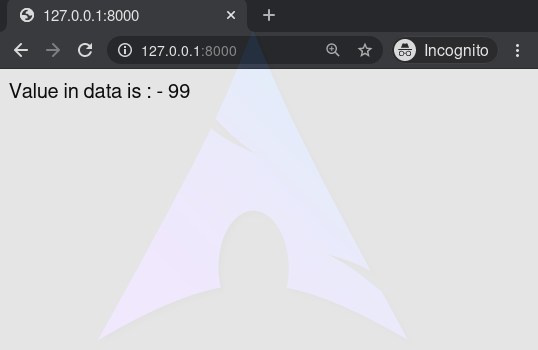if - Теги шаблона Django
A Django template is a text document or a Python string marked-up using the Django template language. Django being a powerful Batteries included framework provides convenience to rendering data in a template. Django templates not only allow paassing data from view to template, but also provides some limited features of a programming such as variables, for loops, comments, extends, if else etc.
This article revolves about how to use if tag in Templates. The {% if %} tag evaluates a variable, and if that variable is “true” (i.e. exists, is not empty, and is not a false boolean value) the contents of the block are output.
Syntax
{% if variable %}
// statements
{% else %}
// statements
{% endif %}
Example
{% if athlete_list %} Number of athletes: {{ athlete_list|length }}{% elif athlete_in_locker_room_list %} Athletes should be out of the locker room soon!{% else %} No athletes.{% endif %} |
In the above, if athlete_list is not empty, the number of athletes will be displayed by the {{ athlete_list|length }} variable.
As one can see, the if tag may take one or several {% elif %} clauses, as well as an {% else %} clause that will be displayed if all previous conditions fail. These clauses are optional.
if – Django template Tags Explanation
Illustration of How to use if tag in Django templates using an Example. Consider a project named geeksforgeeks having an app named geeks.
Refer to the following articles to check how to create a project and an app in Django.
- How to Create a Basic Project using MVT in Django?
- How to Create an App in Django ?
Now create a view through which we will pass the context dictionary,
In geeks/views.py,
# import Http Response from djangofrom django.shortcuts import render # create a functiondef geeks_view(request): # create a dictionary context = { "data" : 99, } # return response return render(request, "geeks.html", context) |
Create a url path to map to this view. In geeks/urls.py,
from django.urls import path # importing views from views.pyfrom .views import geeks_view urlpatterns = [ path("", geeks_view),] |
Create a template in templates/geeks.html,
{% if data %}Value in data is : - {{ data }}{% else %}Data is empty{% endif%} |
Let’s check what is displayed on “/” are displayed in the template.
{% else %}
Let’s check if {% else %} statement is working or not.
Now let’s pass an empty array and use empty tag along with for tag.
In geeks/views.py,
## import Http Response from djangofrom django.shortcuts import render # create a functiondef geeks_view(request): # create a dictionary context = { "data" : False, } # return response return render(request, "geeks.html", context) |
Now, check http://127.0.0.1:8000/,
Advanced Usage
if tags may use and, or or not to test a number of variables or to negate a given variable:
{% if athlete_list and coach_list %}
Both athletes and coaches are available.
{% endif %}
{% if not athlete_list %}
There are no athletes.
{% endif %}
{% if athlete_list or coach_list %}
There are some athletes or some coaches.
{% endif %}
{% if not athlete_list or coach_list %}
There are no athletes or there are some coaches.
{% endif %}
{% if athlete_list and not coach_list %}
There are some athletes and absolutely no coaches.
{% endif %}Attention geek! Strengthen your foundations with the Python Programming Foundation Course and learn the basics.
To begin with, your interview preparations Enhance your Data Structures concepts with the Python DS Course. And to begin with your Machine Learning Journey, join the Machine Learning – Basic Level Course